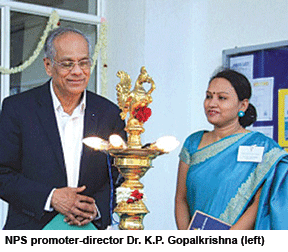 Six years after it became law on April 1, 2010, the Right of Children to Free & Compulsory Education (RTE) Act — particularly s. 12 (1) (c) of the Act which makes it obligatory for private non-minority schools to reserve 25 percent of seats in elementary classes (I-VIII) for children from poor households in their neighbourhood — is tying private school promoters and managements in knots.
Six years after it became law on April 1, 2010, the Right of Children to Free & Compulsory Education (RTE) Act — particularly s. 12 (1) (c) of the Act which makes it obligatory for private non-minority schools to reserve 25 percent of seats in elementary classes (I-VIII) for children from poor households in their neighbourhood — is tying private school promoters and managements in knots.
Although in Society for Unaided Private Schools of Rajasthan vs. Union of India (2010), the Supreme Court in a 2-1 split verdict, upheld the constitutional validity of s. 12 (1) (c) while exempting minority and boarding schools from applicability of this provision of the Act, the overwhelming majority of private school promoters believe that s.12 (1) (c) is tantamount to “backdoor nationalisation” of private school education. Therefore a growing number of private school managements are claiming exempt religious and/or linguistic minority status with some highly respected school promoters going to great lengths to claim exemption.
On September 6, the Central Board of Secondary Education (CBSE) cancelled the affiliation of six National Public Schools in Bangalore and Mysore routinely ranked among Karnataka’s Top 10 days schools in the annual EducationWorld India School Rankings (EWISR), for forging documents to avail minority status, sending shock waves through the city’s academic and parents communities.
These schools are run by the Bangalore-based National Education Trust and allied trusts constituted by Dr. K.P. Gopalkrishna, an eminent Bangalore-based educationist. The six mid-market NPS schools in Bangalore and Mysore highly-reputed for their academic rigour apart, Gopalkrishna has also promoted the high-end CIE, UK and IBO, Geneva-affiliated The International School, Bangalore (TISB), ranked #3 countrywide among international day-cum-boarding schools in EWISR 2016.
Several telephone calls and email messages sent by your correspondent to Dr. Gopalkrishna elicited no reponse. However, after much pressure, The PRactice, a Bangalore-based public relations firm, sent a reply to several questions posed by EW to Dr. Gopalkrishna. “Citizens Education Trust and NAFL Trust have followed all norms and procedures while applying for minority institutions category for the schools. All official documentation that was handed over to the school was accepted in good faith and trust. The recent stay order from the high court of Karnataka on the disaffiliation move bears testimony to the fact that NPS is an institution that is held to (sic) high ethical and moral standards. We had admitted all students under RTE for the academic years 2013-14, 2014-15 and 2015-16, as directed by the BEO (block education officer),” says the email sent on behalf of Gopalkrishna which adds that due to the stay order, no s. 12 (1) (c) admissions have been made in the current academic year 2016-17.
Academics and educationists in Bangalore are unanimous that the exemption granted to minority schools by the Supreme Court has opened a can of worms. “The process by which minority status is granted to schools lacks transparency,” says Nagasimha Rao, convener of the RTE Task Force, a non-government advocacy group monitoring implementation of the RTE Act in Karnataka. “With no specific authority empowered to grant minority status, schools obtain minority certificates from Wakf boards, local panchayats, as well as the State Minority Commission. The NPS case is just the tip of the iceberg. Many private schools across the state are dodging s. 12 (1) (c) by claiming religious and/or linguistic minority status on the basis of promoters’ religion or mother tongue,” he adds.
Private schools have had misgivings about s. 12 (1) (c) of the landmark RTE Act ever since it came into force in April 2010. They fear that s. 12 (1) (c) is the thin end of the wedge for incremental government interference in administration of their schools. Moreover, somewhat inequitably s.12 (2) of the RTE Act requires the state government to reimburse tuition fees of s. 12 (1) (c) children to the extent of the per child expenditure incurred by it in its own government schools which are a fraction of the prescribed fees of high-end and particularly, international schools.
With the issue of admission of poor children at subsidised tuition fees into private schools mired in a swirl of confusion, perhaps it’s time for the Union government and/or the Supreme Court to review the litigious s. 12 (1) (c) which unreasonably transfers part of the State’s constitutional obligation to provide free and compulsory education to privately promoted financially independent schools. In this connection it’s pertinent to bear in mind that the Society for Unaided Schools of Rajasthan Case (2010), which upheld s. 12 (1) (c), was not adjudicated by a full bench of the Supreme Court and that even so was upheld by a wafer thin 2-1 majority.
Sujata Choudhury (Bangalore)